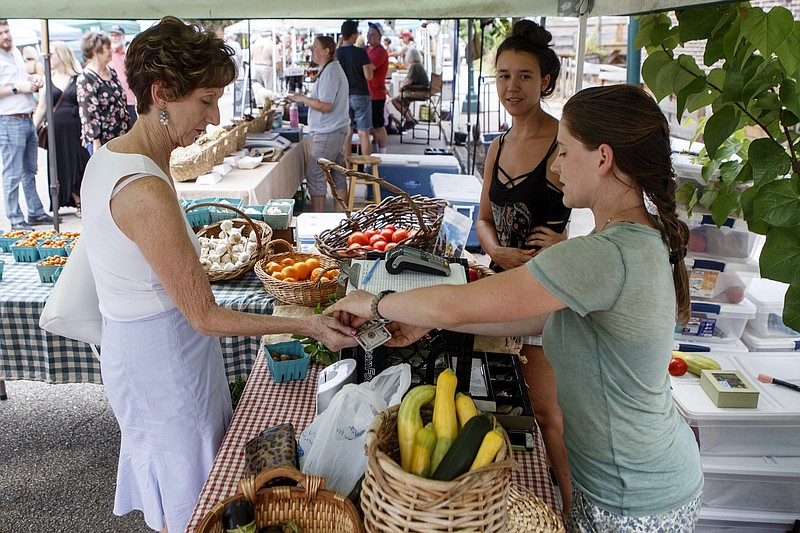On Memorial Day, I think of my grandparents; he fought in World War II Italy and she, at home, raised two baby boomers, one of whom became my mom. My grandparents are buried at the National Cemetery, which will remain flagless Monday, a jarring pandemic image.
To remember them is to also remember food. Holidays, weekend cook-outs, dinners at the old Mt. Vernon. I can still smell her kitchen, see her apron, feel the handle of her kitchen knives. The charcoal on the grill is still being lit. Somewhere nearby, fruit salad is served on yellow plates.
In our lives, food is the preserver.
The nourisher.
The healer.
Even now, in this pandemic. Especially now.
Food matters.
Wet markets in Wuhan. Our own pantries, stocked or not. Restaurants and essential workers. The closing of schools, which meant the closing of school cafeterias. A growing connection between slaughterhouses and infection rates. An increasing shift to vegetarianism.
"We cannot protect against pandemics while continuing to eat meat regularly. Much attention has been paid to wet markets, but factory farms, specifically poultry farms, are a more important breeding ground for pandemics. Further, the CDC reports that three out of four new or emerging infectious diseases are zoonotic - the result of our broken relationship with animals," writes Jonathan Safran Foer in the New York Times.
Just as important as washing your hands and social distancing?
The tomatoes and okra growing in your backyard. The weekly trips to the farmer's market. The labels you read, the seeds you save, the recipes you cook.
The more we know about our food, the more we know about ourselves.
"It all starts with food," said Holly Martin.
Martin, 41, has built her entire career around food and what it means to people.
"I see no reason why a child should graduate from high school not knowing that a pickle came from a cucumber," she said. "That lack of knowledge is rampant, and the disconnect has some serious health ramifications."
As a nutritionist, she worked in local hospitals, witnessing the way diet affects health.
At the Chattanooga Area Food Bank, she saw the painful gap between those with access to healthy food and those without.
As manager of the Main St. Farmers Market (Wednesday afternoons, 4-6), she watched the transformative joy that comes from citizens buying local food from local farmers.
As a mother to three - Sawyer, Ripley and Marlo - she felt intimately the urgent need of creating right relationships with our food and landscapes.
"Securing a future that provides children a food ecosystem that is just, diverse, vibrant, and cohesive," she said.
Martin began wondering: Can all these components merge together?
Thankfully, yes.
Earlier this year, she unveiled our city's first Chattanooga Sustainable Food Center.
"A resource center for local food," she said. "It is, at its core, all about empowerment."
The Food Center will strengthen our local food system - the right relationship between land, farmers and us - in three ways:
Give people greater access to healthy, locally-grown food.
Educate citizens about food democracy, diet and decisions.
Strengthen relationships between farmers and citizens.
Today, Martin is announcing some big news:
A grocery store in the heart of Highland Park.
"Like a brick and mortar farmers' market," she said.
This summer, the Center will open a small, bodega-like grocery store in the historic St. Andrews Center stocked with produce grown by a dozen or so local farmers. Sweet potatoes, okra, buttercrunch lettuce, local honey, strawberries, apples - possibly bulk bins, even.
"To meet the needs of the community," she said. "Not a bottom line."
(The Center will become an official nonprofit soon; more immediate funding would help the grocery store open within days instead of weeks.)
In some neighborhoods, folks fight against opening grocery stores. In other neighborhoods, folks haven't seen a grocery store in years. We live in a food dystopia.
"I have been working on this idea for three years. Since the [pandemic], it has become more timely," she said.
Soon, the Center plans to offer cooking classes to match the growing season. A commercial kitchen to rent. Cooperative learning with schools. All affordable produce.
"Sustainability at its most basic definition is that whatever is taken is given back equally. It seeks a balance and that goes way beyond food. We'll be a better city for it," she said. "Chattanooga seems ripe for the picking to become a transformative food city."
Twelve or so years ago, a friend taught me to plant my first garden.
My whole life changed.
"Food is love," Martin said.
Especially fruit salad.
David Cook writes a Sunday column and can be reached at dcook@timesfreepress.com.
To donate, shop or volunteer, visit chattfoodcenter.org or contact Martin at hmartin@chattfoodcenter.org

